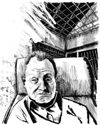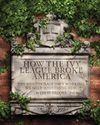
Probably all of us have been inside a place like Town Square location #1512, the fictional big-box store that provides the setting for Adelle Waldman’s new novel, Help Wanted. It’s the kind with colorful seasonal displays and wide aisles, the kind that in the ’80s and ’90s came to signify the peak of American commerce: the convenience of being able to buy baby food, a lawn mower, and a plastic Christmas tree all in one brightly lit, airplane-hangar-size space.
It’s surprising, really, that such stores, emblematic of American capitalism as they are, don’t feature prominently in more novels. Waldman’s Town Square seems almost too obviously allegorical. At #1512, empty shelves pockmark the aisles, giving the store a dilapidated feel. “Corporate” (a vague presence) wants store managers to prioritize low budgets above all else, so the managers have concluded that empty shelves are preferable to spending money on workers to stock items. Business has faded, stolen by an unnamed online retail giant. This image of shrinkage evokes the mood of the novel, which takes place in fictional, hollowed-out Potterstown, in upstate New York, its infrastructure now outsize, dating to a time of more prosperity, more people, more life. The big companies that once had local factories have departed for cheaper workforces, and the residents who didn’t leave with them scramble to assemble enough employment to pay their bills.
Diese Geschichte stammt aus der March 2024-Ausgabe von The Atlantic.
Starten Sie Ihre 7-tägige kostenlose Testversion von Magzter GOLD, um auf Tausende kuratierte Premium-Storys sowie über 8.000 Zeitschriften und Zeitungen zuzugreifen.
Bereits Abonnent ? Anmelden
Diese Geschichte stammt aus der March 2024-Ausgabe von The Atlantic.
Starten Sie Ihre 7-tägige kostenlose Testversion von Magzter GOLD, um auf Tausende kuratierte Premium-Storys sowie über 8.000 Zeitschriften und Zeitungen zuzugreifen.
Bereits Abonnent? Anmelden

The Dark Origins of Impressionism
How the violence and deprivation of war inspired light-filled masterpieces

The Magic Mountain Saved My Life
When I was young and adrift, Thomas Manns novel gave me a sense of purpose. Today, its vision is startlingly relevant.

The Weirdest Hit in History
How Handel's Messiah became Western music's first classic

Culture Critics
Nick Cave Wants to Be Good \"I was just a nasty little guy.\"

ONE FOR THE ROAD
What I ate growing up with the Grateful Dead

Teaching Lucy
She was a superstar of American education. Then she was blamed for the country's literacy crisis. Can Lucy Calkins reclaim her good name?

A BOXER ON DEATH ROW
Iwao Hakamada spent an unprecedented five decades awaiting execution. Each day he woke up unsure whether it would be his last.

HOW THE IVY LEAGUE BROKE AMERICA
THE MERITOCRACY ISN'T WORKING. WE NEED SOMETHING NEW.

Against Type
How Jimmy O Yang became a main character

DISPATCHES
HOW TO BUILD A PALESTINIAN STATE There's still a way.